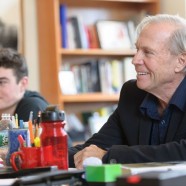
Mark Hilgendorf
History and Social Sciences Department
Member of the Faculty, 1982–2016
Of Mark Hilgendorf, one history department colleague said, “He is a master at inviting our connection with each other around the table,” of encouraging “a radical sense of shared humanity.” I’ll begin there, as perhaps there’s no higher praise for a career educator. For Mark, though, such connection was, from the beginning, the goal.
He arrived at Milton 34 years ago, in 1982, with his wife, Cindy, and their two, very young children in tow, fresh out of a doctoral program in African-American history.
A committed civil-rights activist and a young teacher, he came to campus with a vision for the relationships of the classroom, one that resisted conventional notions of authority: He believed in the importance of treating students as intellectual equals—of empowering them by creating a space where they could trial ideas without fear of judgment.
Right away, Mark and Cindy moved into Little House, where he would live for his whole Milton career, racking up 30 years as dorm faculty in Hathaway. In this setting, Tarim and I knew Mark where, along with Sally, Doug, Laurence and Patrice, we lived our lives aside 30 adolescent girls. My favorite images of him surface from those years: Mark on the tennis-slash-basketball court, late into the afternoons, hitting or shooting with anyone willing to take on this creaky but competitive athlete and coach; Mark in the hammock, reading under the blooming, overgrown rhododendrons, reggae sounding through the windows; Mark riding across the field on his beat-up 10-speed, skull protected by that silly, unbuckled ski helmet, headed for his classroom. The dorm has always been community for Mark, as it was for all of us—a work/life intersection so unique and vital. Here, Mark understood, in this place where we could come to know the “full adolescent child,” so much teaching happened.
And just down Centre Street, on main campus, his iconic classroom—its walls covered with student artwork and images of cultural and political leaders of the 1960s—was a haven for Mark and his students. He taught across the department’s curriculum, with African-American History his signature course, around which he achieved a cult following, his devotees fiercely loyal. Mark remembers the late ’80s as an exciting time: The department was shifting away from teaching history as a series of maps and dates and toward teaching it as a record of cultural and social change. “We were kicking down the boundaries,” Mark recalls, encouraging conversations about race, class and gender—focusing on “humanity in the history.” Graduates with whom I’ve spoken quickly point to this focus in Mark’s teaching, often praising it as “life-changing.” One graduate said, “His Senior Seminar class changed the way I think about history altogether. We learned so much about how people experienced events and timeless themes: justice, revolution, democracy.” Another noted that while history has taught her that ugly narratives—injustice, oppression—mark our human condition, his classes allowed her to discover the ever-presence of hope and transcendence: themes that cut through race and culture, that persisted in the face of darker counter-stories. A colleague remarked on his skill at promoting deep listening and discussion—to wade into big “ideas,” as Mark would say, to ask questions like, “Can history teach us empathy?” and “Can history heal us?”
The classroom spilled over into his work with student groups, particularly Christian Fellowship, which he advised for 14 years, and Onyx, which he advised for 20. Mark believed that academic learning should underscore our work around identity, and vice versa—our intellectual, emotional and spiritual selves in full interrelationship. Long before it became fashionable to consider this a duty of an educator, Mark was committed, in and out of the classroom, to the “whole selves” of his students. This commitment so often galvanized his activism; no surprise, for example, that Mark was one of the founders of the Transitions Program, initially an effort to address significant attrition among black boys, and he continued to teach in the program for the next 32 years.
Our old crew from the dorm gathers, when we can, for a reunion dinner. After all, we lived a lot in that stretch: children born, children growing, relationship entanglements, and of course, death—precisely the life-stuff that reminds us of our shared humanity. Inevitably, when we get together, we marvel over the march of time, how we look up and, suddenly, say, 34 years have passed. Mark’s not sure what the next chapter holds, though he knows he will live other chapters, likely other iterations of teaching: counseling, ministry, maybe a journey home to Milwaukee, where he first launched his teaching career. I think of Mark’s lesson that history exposes the persistence of hope. In this light, surely endings here will yield even more meaningful beginnings.
Lisa Baker
English Department



